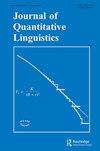文体指纹、pos标签和屈折语言:波兰语的个案研究
IF 1.7
2区 文学
0 LANGUAGE & LINGUISTICS
引用次数: 2
摘要
摘要在风格计量研究中,最频繁单词(MFW)和字符n-gram的频率优于其他风格标记,即使它们的性能在不同语言之间存在显著差异。在屈折语言中,词尾起着重要作用,因此使用通用文本标记无法识别不同的单词形式。无数的屈折词形使频率变得稀疏,使大多数统计过程变得复杂。据推测,应用一种NLP技术,如引理化和/或解析,可能会提高分类的性能。本文的目的是检验语法特征(通过POS标记n-gram评估)和旅名化形式在识别作者简介方面的有用性,以解决词汇和语法中选择自由度的根本问题。使用波兰小说语料库,我们进行了一系列有监督的作者归因基准测试,以比较不同类型的词汇和句法风格标记的分类准确性。即使POS标记和旅鼠化形式的表现比词汇标记差得臭名昭著,但差异并不大,从未超过ca.15%。本文章由计算机程序翻译,如有差异,请以英文原文为准。
Stylistic Fingerprints, POS-tags, and Inflected Languages: A Case Study in Polish
ABSTRACT In stylometric investigations, frequencies of the most frequent words (MFWs) and character n-grams outperform other style-markers, even if their performance varies significantly across languages. In inflected languages, word endings play a prominent role, and hence different word forms cannot be recognized using generic text tokenization. Countless inflected word forms make frequencies sparse, making most statistical procedures complicated. Presumably, applying one of the NLP techniques, such as lemmatization and/or parsing, might increase the performance of classification. The aim of this paper is to examine the usefulness of grammatical features (as assessed via POS-tag n-grams) and lemmatized forms in recognizing authorial profiles, in order to address the underlying issue of the degree of freedom of choice within lexis and grammar. Using a corpus of Polish novels, we performed a series of supervised authorship attribution benchmarks, in order to compare the classification accuracy for different types of lexical and syntactic style-markers. Even if the performance of POS-tags as well as lemmatized forms was notoriously worse than that of lexical markers, the difference was not substantial and never exceeded ca. 15%.
求助全文
通过发布文献求助,成功后即可免费获取论文全文。
去求助
来源期刊

Journal of Quantitative Linguistics
Multiple-
CiteScore
2.90
自引率
7.10%
发文量
7
期刊介绍:
The Journal of Quantitative Linguistics is an international forum for the publication and discussion of research on the quantitative characteristics of language and text in an exact mathematical form. This approach, which is of growing interest, opens up important and exciting theoretical perspectives, as well as solutions for a wide range of practical problems such as machine learning or statistical parsing, by introducing into linguistics the methods and models of advanced scientific disciplines such as the natural sciences, economics, and psychology.
 求助内容:
求助内容: 应助结果提醒方式:
应助结果提醒方式:


